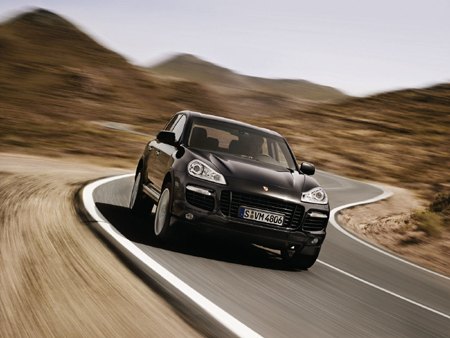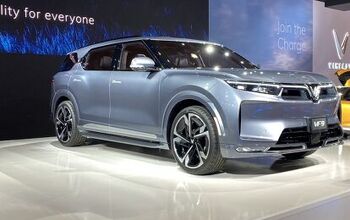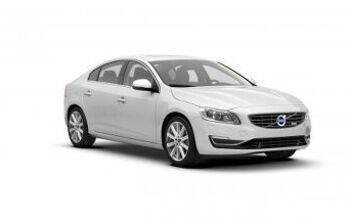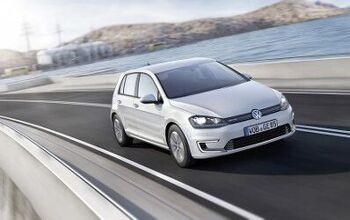Is Green the Auto Industry's New Black?
“A potent, new, 500-hp engine that uses less fuel.” While the newly refurbished Porsche Cayenne Turbo offers well-heeled buyers many delights, you wouldn't think fuel efficiency was the first amongst them. Yet Porsche’s print ads for the off-roader are touting their uber-SUV’s improved frugality, positioning the machine as a fun-to-drive grocery-getter for, gulp, environmentally conscious consumers. If Porsche were alone in this misplaced appeal to green values, it could be dismissed as aberrant lunacy. But they’re not so it can’t.
This month, Honda introduced their new Formula One car. As their F1 entry has no official sponsors, the car’s surface is free from the usual blizzard of sponsors’ decals. So Honda wrapped their hi-tech race car in an image of the Earth made from signatures of people who’ve pledged– via myearthdream.com– to limit their planetary “footprint.”
And so a vehicle that gets four miles to a gallon– for entertainment purposes– has been transformed into a rolling poster for corporate sponsored environmentalism.
“The people who work in F1 and the F1 viewers are probably the most difficult people to turn around into making a difference,” proclaimed Jenson Button to the London Times. ”So this campaign is important.” Honda’s F1 driver was clear about his “other” mission. “The idea is to raise awareness of global issues that we have and hopefully it’s going to make a difference.”
Honda’s left its supporters’ difference-making methodology suitably vague. Of course, turned around F1 fans can choose from Honda’s wide range of high[er] mpg vehicles, buy one its hybrid Accords or wait for models powered by the automaker’s clean diesel technology. It’s what marketing mavens call a “virtuous circle” or “a very clever angle.”
Honda’s inherently ludicrous “Save the Planet” F1 car proves that global warming is the new marketing hot button (so to speak). Of course, Honda’s a bit late to this morality play. Toyota’s Prius hybrid set the pace for automobile manufacturers everywhere, giving the Japanese automaker enough green cred to withstand the heat generated by its efforts to build The Mother of All Full-Size ‘Merican Pickup Trucks.
Although the high-mpg low-carbon Prius has not exactly set the sales charts on fire, the distinctively shaped vehicle success vis-à-vis its standard bodied hybrid competition (e.g. the hybrid Accord) has taught the automotive industry an important lesson: it’s not enough to do good for the planet. You have to be seen to be doing good.
That’s why nearly every major automaker at this year’s 77th International Auto Show paid homage to the environment. Honda, Lexus and Toyota brought hybrid concept cars to the Land of Milk and Chocolate. Mercedes flaunted a new C220 sedan equipped with the latest clean-running BLUETEC diesel. Ze new C will produce nine tons less CO2 over its lifetime – from assembly line to junkyard – than the old version! Even supercar maker Koenigsegg presented an E85 powered version of their bonkers CCXR.
And no wonder. Throughout Europe, global warming has replaced the Soviet Empire as the invisible– though real– enemy. It’s got to the point where the European Union has “asked” Germany to consider putting speed limits on formerly sacrosanct derestricted sections of the autobahn. A Stern magazine survey claims 60 percent of Germans now favor autobahn speed limits to cut emissions, while 38 percent oppose them.
America’s response to global warming lags well behind that of our European allies. While there’s been a lot of talk (and an Oscar-winning movie) about reducing greenhouse gas emissions, policy changes have been illusory. Despite tax credits, hybrid sales are still paltry compared to CO2 belching full-sized pickups.
While environmentalists decry federal “foot dragging,” the free market is not insensitive to the issue. As petrol powered pistonheads have pointed out, even with gas at $3 a gallon, it’s hard to justify the “hybrid premium”: the difference in purchase price between a gas and gas – electric car based on fuel savings.
And yet more and more US car buyers are willing to pay a bit extra for a bit more mileage. Why? Representative Michael Burgess of Texas put it best, when discussing his personal Prius. “It gives me a good deal of moral superiority when I drive.”
This fact has not escaped the fine folks down in marketing and product planning. GM, Ford, Porsche, Mercedes, BMW, Honda and others are realizing a large proportion of their target market– both princes and paupers– are starting to watch their tailpipes. Low carbon and high mileage cars, trucks and yes, SUV’s are continuing to creep to the top of the average buyer’s wish list.
As the Cayenne Turbo ads prove, this development has created endless opportunities for deceptive and self-righteous hypocrisy. But that’s not necessarily a bad thing. If green becomes the automotive industry’s new black, the resulting pretense can be seen as a case of no harm, no foul.
More by Michael Martineck
Latest Car Reviews
Read moreLatest Product Reviews
Read moreRecent Comments
- EBFlex Will I miss the Malibu? No. Will GM miss the Malibu? Absolutely. They are going from making a vehicle that makes money moving 150k a year and converting the plant to make EVs (that nobody wants) at a loss every year and far less volume. The amount of stupid that is always present when it comes to EVs is astounding. The experiment is over GM. Move on
- Mike Beranek In the sedan game, it's now either Camry or Accord. The rest are just background noise.
- Theflyersfan I know their quality score hovers in the Tata range, but of all of the Land Rovers out there, this is the one I'd buy in a nanosecond, if I was in the market for an $80,000 SUV. The looks grew on me when I saw them in person, and maybe it's like the Bronco where the image it presents is of the "you're on safari banging around the bush" look. Granted, 99% of these will never go on anything tougher than a gravel parking lot, but if you wanted to beat one up, it'll take it. Until the first warning light.
- Theflyersfan $125,000 for a special M4. Convinced this car exists solely for press fleets. Bound to be one of those cars that gets every YouTube reviewer, remaining car magazine writer, and car site frothing about it for 2-3 weeks, and then it fades into nothingness. But hopefully they make that color widespread, except on the 7-series. The 7-series doesn't deserve nice things until it looks better.
- Master Baiter I thought we wanted high oil prices to reduce consumption, to save the planet from climate change. Make up your minds, Democrats.





































Comments
Join the conversation
"I remember pre Katrina you never heard anything in advertising about MPG, at least not with any prominence. Now that is all you see. Honda is one of the few manufacturer’s that actively tries to keep MPG up across the board and has for years." I think that is the definition of observer bias. Ads have touted mileage since gas cost money. dolo54: "I’m no scientist… but there have been quite a few hurricanes lately." A scientist has to consider the entire systems, not just the data he has from the system. I'm sure you think there've been many hurricanes lately, but in reference to what? People have been here for ~250K years, while life on earth extends back to >3.5billion years (eukaryotes 2billion!) It doesn't seem like we've been here observing the earth for very long. Western hurricanes have only been observable since we've begun to observe them (~50-70 years). Data for water temperature has only been around since we've decided to probe it (~30 years). Where on that time scale to you put the statement "there sure seems like more hurricanes". This bring us back to observers bias. Have you ever thought about buying a car then suddenly seen more of them on the road or seen gas prices hit $6/gallon in atlanta then suddenly become aware of mpg ratings on cars? It is because we are aware of them. For example, the hole in the ozone layer was discovered when we had the technology to scan the ozone layer. was it there before? Yes! Did we cause it? probably/maybe/maybe not. Have we done a lot to fix it? sure! is it gone? nope. We do not have an increasing number of hurricanes/year on average. we have an increasing number of KNOWN hurricanes/year on average. In the 1890's how much weather equipment did we have set up in the gulf of mexico? We only knew about hurricances that made landfall. Sometimes things are out of out control. Did you know the average temperature for the earth is 47 centigrade? Did you know we had a mini iceage in the 1500s! Climate is some pretty badass shit. some real surprises looking at the weather map this February... you know how often it snows in alabama and mississippi? I'll give you a hint - way back when it was cold, before global warming happened, Atticus Finch said that he'd never seen it snow before in his life. It's called CLIMATE. And, like all science -from stem cells to breat cancer- sometimes its political.
PS when its not political anymore it'll be a fad... like the ozone layer, aids, and homeless people.